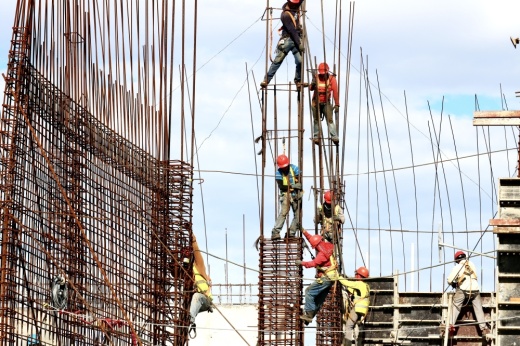House Bill 2127, by Rep. Dustin Burrows, R-Lubbock, aims to prevent local leaders from passing or enforcing ordinances related to finance, agriculture, labor, property and more. Essentially, any topics that are covered by state or federal laws could not be regulated locally. Texans would also be allowed to sue their community officials if they believe local regulations go against state law.
The bill was approved by the House with a 92-55 vote, largely along party lines.
Burrows said the proposal, which is widely known as the “local preemption bill,” would ensure consistency across Texas and benefit local businesses that are sometimes caught up with differing regulations between cities.
“We want those small-business owners creating new jobs and providing for their families, not trying to navigate a byzantine array of local regulations that twist and turn every time they cross city [boundaries],” Burrows said as the House debated his bill April 18.
In a statement when the bill was first filed, Annie Spilman, the Texas director of the National Federation of Independent Businesses, lauded Burrows for his proposal.
“The patchwork of regulations that currently exist in Texas makes it more difficult for a business to operate and create jobs,” Spilman said. “The world’s ninth-largest economy shouldn’t be subjected to the whims of rogue regulators—who often pass onerous mandates in the dead of night.”
But the bill’s opponents argued it would keep local officials from dealing with their cities’ needs.
“HB 2127 is unconstitutional; it’s against the will of Texas voters,” said Rep. Chris Turner, D-Grand Prairie.
He said it does not make sense to enact sweeping changes across the state because “Texas is unique, and our communities are diverse. A cookie-cutter, one-size-fits-all approach simply does not work for our vast and complex state.”
Labor leaders and community organizations have expressed concerns that the bill would harm workers and reign in existing safety protections. In Austin and Dallas, regulations that allow construction workers to take a 10-minute break every four hours would be repealed. These local ordinances are meant to protect workers from overheating during the summer months, but similar rules are not included in Texas or federal law.
“This is going to have a direct impact on workers, on the people that are building our state,” said Ana Gonzalez, the deputy director of politics and policy for the Texas AFL-CIO. “And now they won't be able to get those breaks or report that if their employers don't provide them with breaks.”
The Texas AFL-CIO is a federation of labor unions across Texas.
Ahead of the House’s initial vote April 18, members of the Workers Defense Project, a workers rights nonprofit, gathered outside the House chamber with signs that read “give us a break” and “protect local freedom.” One sign said “[a] construction worker dies every three days in Texas.”
According to the U.S. Bureau of Labor Statistics, 115 people died in Texas while doing construction and extraction work in 2021.
“Are we really going to ... stand here in this air-conditioned building and tell workers in Texas on construction sites that they are not entitled to one 10-minute rest break every four hours?” Turner asked his colleagues on the House floor.
On April 18, lawmakers proposed 38 amendments to the bill to allow local governments to enforce workplace protections, prevent discrimination and more. All but two amendments, which edited small structural portions of the bill, failed.
Democrats said the bill would overturn local nondiscrimination ordinances, which protect Texans from being denied from a job or housing for things such as sexual orientation, political affiliation or veteran status. Under federal law, discrimination is prohibited based on national origin, race, color, religion, disability, sex and familial status.
However, Gonzalez said there are no protections in place for people who work at companies with 15 or fewer employees, which opens them up to discrimination.
The bill’s opponents are also concerned about how HB 2127 would impact the ability of cities and counties to pass regulations during natural disasters, an economic recession or another pandemic.
Luis Figueroa, the chief of legislative affairs for the progressive nonprofit Every Texan, said because the Texas Legislature does not meet every year, disasters and other issues “that may necessitate some action by cities” are bound to happen while lawmakers are away from Austin.
“Cities are going to be reluctant to take those actions because they're worried they're going to get sued,” Figueroa said. “Some communities may take the risk and try to pass an ordinance and wait for the courts to figure it out. But other city councils are going to be fearful of taking those actions and just live with the consequences of ... that natural disaster or recession, and that ultimately is going to harm their local community.”
The bill deals with large portions of state law and generally does not say what specific types of local ordinances are prohibited. Figueroa said this leaves a lot of room for interpretation by local courts, which could result in a lot of expensive and time-consuming litigation.
HB 2127 now heads to the Texas Senate. Sen. Brandon Creighton, R-Conroe, filed an identical piece of legislation—Senate Bill 814. Creighton’s bill was considered during a public committee hearing April 4 but has not passed out of the Senate Committee on Business and Commerce.
“We really encourage the Senate to really take a hard look at this [legislation] and determine whether they really want to become the de facto city council and mayors of every city in Texas,” Figueroa said.





